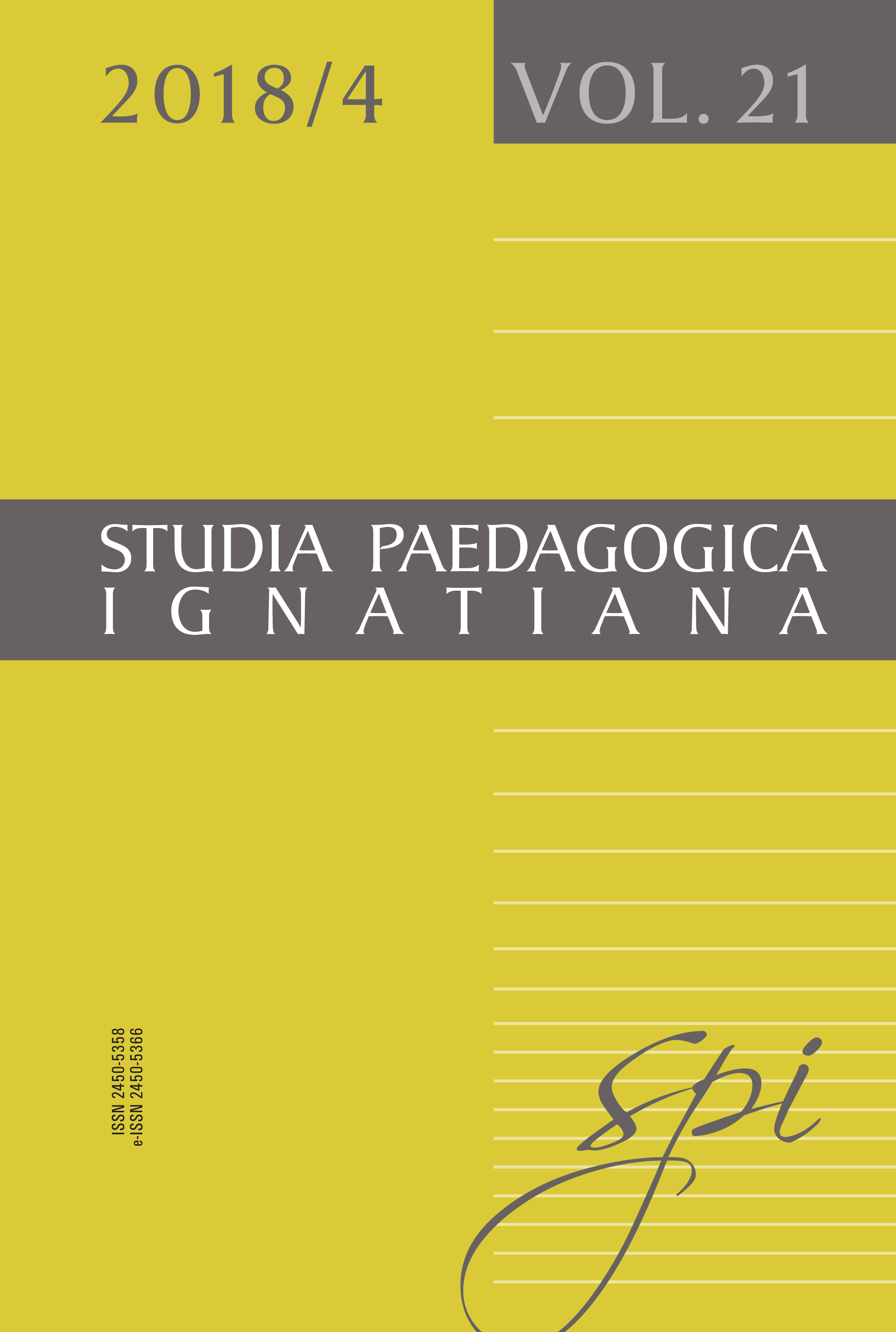Refleksyjność wyzwaniem współczesnego świata
DOI:
https://doi.org/10.12775/SPI.2018.4.003Słowa kluczowe
refleksyjność, bezrefleksyjność, myślenie refleksyjne, społeczeństwo informacyjneAbstrakt
Szybki postęp cywilizacyjny i elektroniczny; rozwój świata wirtualnego; który nastąpił w XXI wieku; zmienił sposób bycia i funkcjonowania człowieka. W sytuacji powiększającej się autonomii osoby w zakresie dostępu do informacji; a także oczekiwań w zakresie samodzielności w kreowaniu własnego rozwoju; zagadnienie refleksyjności nabiera szczególnego znaczenia. Tym bardziej; że dostrzegalne współcześnie deficyty refleksyjności budzą niepokój dotyczący indywidualnego rozwoju osoby. Dlatego przedmiotem teoretycznej analizy będzie zagadnienie refleksyjności w odniesieniu do aksjonormatywnego chaosu; jaki jest obecny w świecie. Zostaną omówione wymiary refleksyjności; następnie przedstawiona będzie koncepcja odnosząca się do refleksyjności i bezrefleksyjności oraz ukazana zostanie refleksyjność jako ważne zadanie rozwojowe.
Bibliografia
Bard A.; Soderquist J.; Netokracja. Nowa elita władzy i życie po kapitalizmie; przeł. P. Cypryański; Wydawnictwa Akademickie i Profesjonalne; Warszawa 2006.
Chrost M.; Autorefleksyjność elementem samowychowania; w: Wychowanie – Socjalizacja – Edukacja. Księga Jubileuszowa dedykowana prof. dr. hab. Andrzejowi Michałowi de Tchorzewskiemu z okazji 75. rocznicy urodzin i 50-lecia pracy naukowej; red. M. Chrost i K. Jakubiak; Wydawnictwo Naukowe Akademii Ignatianum w Krakowie; Kraków 2018;
s. 493–505.
Chudy W.; Refleksja; w: Encyklopedia pedagogiczna XXI wieku; t. 5; red. T. Pilch; Wydawnictwo Akademickie „Żak”; Warszawa 2006; s. 68‒72.
Dróżka W.; Kategorie analityczne w badaniach pedeutologicznych w świetle założeń refleksyjnych nurtów poznawczych w naukach społecznych; „Chowanna” 2006; t. 1(26); s. 26‒48.
Gara J.; Egzystencjalna problematyzacja poszukiwania; poznawania i tworzenia samego siebie; „Przegląd Pedagogiczny” 2017; nr 2; s. 9‒33.
Hejnicka-Bezwińska T.; Pedagogika ogólna; Wydawnictwa Akademickie i Profesjonalne; Warszawa 2008.
Jagiełło M.; Spotkania; które zmieniają. O spotkaniu jako kategorii pedagogicznej i wydarzeniu wychowującym na drodze życia; Oficyna Wydawnicza „Impuls”; Kraków 2012.
Kielar-Turska M.; Rozwój człowieka w pełnym cyklu życia; w: Psychologia. Podręcznik akademicki; t. 1: Podstawy psychologii; red. J. Strelau; Gdańskie Wydawnictwo Psychologiczne; Sopot 2003; s. 313‒314.
Langer E.; Problemy uświadamiania. Konsekwencje refleksyjności i bezrefleksyjności; w: Poznanie. Afekt. Zachowanie; red. T. Maruszewski; Wydawnictwo Naukowe PWN; Warszawa 1993; s. 137–179.
Lasocińska K.; Niecodzienna codzienność ‒ globalizacja wyzwaniem do refleksyjnego konstruowania własnej biografii; „Civitas Hominibus. Rocznik Filozoficzno-Społeczny” 2011; nr 6; s. 46‒50.
Pietrasiński Z.; Mądrość; czyli świetne wyposażenie umysłu; Wydawnictwo Naukowe „Scholar”; Warszawa 2001.
Przybył I.; Refleksje profesora Zbigniewa Tyszki nad człowiekiem i rodziną XXI wieku; „Roczniki Socjologii Rodziny” 2005; t. 16: Dylematy współczesnych rodzin; s. 245‒249.
Regulska A.; Rola wartości moralnych w procesie wychowania; „Studia nad Rodziną” 2013; t. 17; nr 1(32); s. 143‒150.
Słaba D.; Wokół zagadnień refleksyjności w rozwoju człowieka dorosłego; „Chowanna” 2014; nr 2(43); s. 321‒338.
Słownik języka polskiego; red. M. Szymczak; Wydawnictwo PWN; Warszawa 1981.
Sternberg R.J.; Images of Mindfulness; „Journal of Social Issues” 2000; nr 56; s. 11‒26.
Sujak E.; Rozważania o ludzkim rozwoju; Wydawnictwo Znak; Kraków 1987.
Wallerstein I.M.; Koniec świata jaki znamy; przeł. M. Bilewicz; A.W. Jelonek; K. Tyszka; Wydawnictwo Naukowe „Scholar”; Warszawa 2004.
Pobrania
Opublikowane
Jak cytować
Numer
Dział
Licencja
Autor zgłaszając swój artykuł oświadcza, że:
jest Autorem artykułu (zwanego dalej Utworem) i:
- przysługują mu wyłączne i nieograniczone prawa autorskie do Utworu,
- jest uprawniony/a do rozporządzania prawami autorskimi do Utworu.
Udziela Uniwersytetowi Ignatianum w Krakowie nieodpłatnej, niewyłącznej, nieograniczonej terytorialnie licencji do korzystania z Utworu na następujących polach eksploatacji:
- utrwalania utworu w formie papierowej, a także na nośniku cyfrowym lub magnetycznym;
- zwielokrotnienia utworu dowolną techniką, bez ograniczenia ilości wydań i liczby egzemplarzy;
- rozpowszechniania utworu i jego zwielokrotnionych egzemplarzy na jakimkolwiek nośniku, w tym wprowadzenia do obrotu, sprzedaży, użyczenia, najmu;
- wprowadzenia utworu do pamięci komputera;
- rozpowszechniania utworu w sieciach informatycznych, w tym w sieci Internet;
- publicznego wykonania, wystawienia, wyświetlenia, odtworzenia oraz nadawania i reemitowania, a także publicznego udostępniania utworu w taki sposób, aby każdy mógł mieć do niego dostęp w miejscu i czasie przez siebie wybranym;
- w zakresie praw zależnych do Utworu, obejmujących w szczególności prawo do dokonania koniecznych zmian w Utworze, wynikających z opracowania redakcyjnego i metodycznego, a także do dokonania tłumaczenia Utworu na języki obce.
Udzielenie licencji następuje z chwilą przekazania Utworu na rzecz Uniwersytetowi Ignatianum w Krakowie. Uniwersytet Ignatianum w Krakowie jest uprawniony do udzielania dalszych sublicencji do Utworu, w zakresie udzielonego prawa. Licencja jest ograniczona czasowo i zostaje udzielona na okres 15 lat, licząc od daty jej udzielenia.
Polityka prywatności
Statystyki
Liczba wyświetleń i pobrań: 1002
Liczba cytowań: 0



